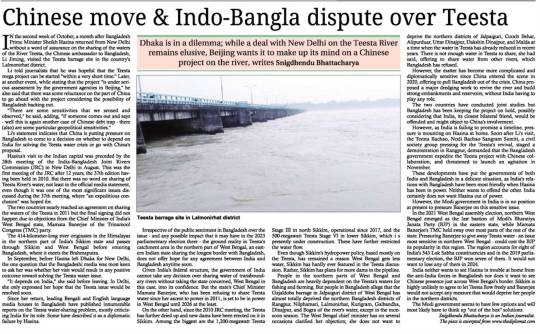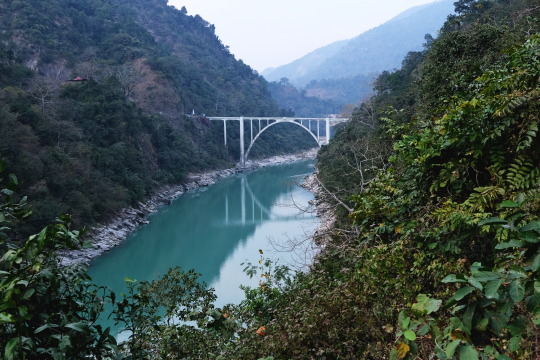#teesta
Photo

Chinese move & India-Bangladesh dispute over Teesta
#teesta#india#bangladesh#china#snigdhendu bhattacharya#the diplomat#financial express#teesta barrage#lalmonirhat#west bengal
2 notes
·
View notes
Text
Can’t India resolve the Teesta issue by following the Obiter Dicta of the UN.

The Teesta is a transboundary river shared by India and Bangladesh. In response to West Bengal’s decision to dig canals to drain water from the Teesta, Bangladesh's foreign ministry has sent a note verbal to India, seeking information about media reports that said that India has initiated a project to divert water from the Teesta. The West Bengal government has decided to develop two additional canals to drain water from the Teesta. Jaldhaka, another transboundary river, would also be diverted into the canals for use in agriculture. The Teesta Barrage Project has already allotted 1,000 acres of land to the West Bengal Irrigation Department for the canals, which are anticipated to assist 100,000 farmers in Jalpaiguri and Coch Bihar. The decision of West Bengal to dig two more canals for diverting water from the transboundary Teesta River will badly affect the lives and livelihoods of about two crore people in Bangladesh.
A Long Ordeal for Bangladesh
54 rivers that go from the Himalayas to the Gulf of Bengal are shared by Bangladesh and India. The management of such transnational or transboundary rivers is best done in compliance with international treaties and norms, such as the UN Water-Sharing Convention of 1997, the Berlin Rules, and the Helsinki Rules. Yet, this takes the form of bilateral agreements between the relevant parties in South Asia. As a consequence, the higher riparian nations often benefit and get uneven shares. For instance, Bangladesh suffers when India builds canals and barrages. In relation to the Brahmaputra River, India and China share the same problem. As a consequence, Bangladesh has only been successful in convincing India to sign agreements regarding the Ganges and the Kushiyara rivers. The Ganges River Treaty was followed by the Kushiyara Agreement by over 25 years. The Teesta water-sharing agreement has not been signed after ten years of discussions.
The Consequence
Northern Bangladesh will grow drier because of the arbitrary withdrawal of water. The advantages, meanwhile, will come at the expense of northern Bangladeshi farmers. Teesta is a transboundary river, and Bangladesh and India should share its water in accordance with the international water-sharing agreement in an equitable and fair way. Regrettably, Bangladesh has been deprived of such equality and reason as upper-riparian India builds barrages, dams, and canals on its own initiative, reducing the river's flow to Bangladesh.
Following the Obiter Dicta of the UN Charter for Good Will
So, what made India think that it could withdraw the water from the Teesta unreasonably? River basin management has long been advocated in the cases of Bangladesh and India to prevent such confrontations. But in order to do it, the higher riparian side must accept justice and logic. But unfortunately, India hasn’t ratified the 1997 UN Convention on International Watercourses. Where only one article can settle the Teesta issue. Which is Article 7 of the 1997 UN Convention on International Watercourses. According to Article 7(1) of the United Nations Watercourses Law or Watercourses Convention, no country can control the downstream or downstream of another country by damming upstream of any transboundary river. Article 5 of the Convention states: "(1) Watercourse States shall, in their respective territories, utilize an international watercourse in an equitable and reasonable manner.
And last of all, as Bangladesh's foreign ministry has sent a note verbale to India, seeking information about media reports that India has initiated a project to divert water from the Teesta, it is important to know Article 12 of the convention. Article 12 of the convention says: "Before a watercourse state implements or permits the implementation of planned measures that may have a significant adverse effect upon other watercourse states, it shall provide those states with timely notification thereof. Such notification shall be accompanied by available technical data and information, including the results of any environmental impact assessment, in order to enable the notified states to evaluate the possible effects of the planned measures."
Evidently, India is not bound to accept that clause. Because the treaty has not been ratified. But there is something that India and other member states of the UN haven’t said yet. India is surely not bound to accept the 'ratio decidendi' of this law as it has not ratified it, but as a member state of the United Nations, it is bound to follow the 'obiter dicta' of all UN Charters.
Brushing the issue under the carpet would be unwise
Brushing the issue under the rug would be detrimental to the long-term health of India-Bangladesh relations. Given the circumstances, it cannot be emphasized enough how important it is for Bangladesh to find a sustainable solution to the long-drawn-out Teesta water-sharing saga with India. Despite decades of negotiations and numerous promises from our Indian partners, the Teesta water-sharing agreement between Bangladesh and India is nowhere near being settled. So far, India has benefited the most from the deals that have been signed between India and Bangladesh. Be it the transit and transshipment corridor from Bangladesh or any other bilateral trade agreements, India has always been a gainer. The Teesta water-sharing issue can be an area where India can selflessly make Bangladesh the gainer to uphold the epitome of true friendship.
about the Author:
Sohail Arman
Former Additional Secretary, Bangladesh Civil Service.
PhD Fellow, The University of Newcastle,
Sydney, Australia.
Read the full article
0 notes
Text

Coronation Bridge, Teesta, West Bengal, India
0 notes
Text
Teesta Setalvad gets bail: तीस्ता सेटलवाड यांना सुप्रीम कोर्टाचा दिलासा; अंतरिम जामीन मंजूर
Teesta Setalvad gets bail: तीस्ता सेटलवाड यांना सुप्रीम कोर्टाचा दिलासा; अंतरिम जामीन मंजूर
Teesta Setalvad gets bail: तीस्ता सेटलवाड यांना सुप्रीम कोर्टाचा दिलासा; अंतरिम जामीन मंजूर
Teesta Setalvad gets bail: सामाजिक कार्यकर्त्या तीस्ता सेटलवाड यांना सर्वोच्च न्यायालयानं अंतरिम जामीन मंजूर केला आहे.
Teesta Setalvad gets bail: सामाजिक कार्यकर्त्या तीस्ता सेटलवाड यांना सर्वोच्च न्यायालयानं अंतरिम जामीन मंजूर केला आहे.
Go to Source
View On WordPress
#bail#gets#setalvad#teesta#अंतरिम#आंतर राष्ट्रीय मराठी बातम्या#आंतरराष्ट्रीय#आंतरराष्ट्रीय बातम्या#कोर्टाचा#जामीन#तीस्ता#दिलासा#भारत लाईव्ह मीडिया इंटरनेशनल#मंजूर#मराठी वल्ड न्यूज#यांना#वैश्विक बातम्या#सुप्रीम#सेटलवाड
0 notes
Text
ایس آئی ٹی کامبینہ دعویٰ: مرحوم احمد پٹیل کے کہنے پر تیستا اور دیگر نے حکومت کو کمزور کرنے کی سازش کی
ایس آئی ٹی کامبینہ دعویٰ: مرحوم احمد پٹیل کے کہنے پر تیستا اور دیگر نے حکومت کو کمزور کرنے کی سازش کی
ایس آئی ٹی کامبینہ دعویٰ:
مرحوم احمد پٹیل کے کہنے پر تیستا اور دیگر نے حکومت کو کمزور کرنے کی سازش کی
احمد آباد ، 16 جولائی ( آئی این ایس انڈیا)
گجرات ایس آئی ٹی نے سماجی کارکن تیستا سیتلواڑ کیخلاف اپنے حلف نامہ میں بڑا؛بلکہ سنسنی خیز انکشاف کرڈالاہے۔ سیتل واڑ، ریٹائرڈ ڈی جی پی آر بی سری کمار اور سابق آئی پی ایس افسر سنجیو بھٹ پر 2002 کے گجرات فسادات کے سلسلے میں ثبوت گھڑنے اور سازش…

View On WordPress
0 notes
Text
तीस्ता सीतलवाड़ को रिहा कर उनके खिलाफ आरोपों को वापस ले भारत: ह्यूमन राइट्स वॉच
न्यूयॉर्क। ह्यूमन राइट्स वॉच ने आज कहा कि भारतीय सरकारी तंत्र को प्रख्यात मानवाधिकार कार्यकर्ता तीस्ता सीतलवाड़ को तुरंत रिहा करना चाहिए, उनके खिलाफ सभी आरोप वापस लेने चाहिए और उन पर लगातार हमलों को बंद करना चाहिए। पुलिस ने कहा है कि वह सीतलवाड़ और व्यवस्था के भीतर से आवाज उठाने वाले दो पूर्व वरिष्ठ पुलिस अधिकारियों के खिलाफ गुजरात में मुसलमानों को निशाना बनाकर की गई 2002 की भीड़ हिंसा की…

View On WordPress
0 notes
Photo

டீஸ்டா செடல்வாட் கைது குஜராத் கலவர தீர்ப்பு - சமூக ஆர்வலர் செய்தியாளர் சந்திப்பு விரிவாக படியுங்கள் 👉 http://www.cmovietube.com/Teesta-Setalvad-arrested-Gujarat-riots-verdict-Social-activist-press-conference-News-1564567336.html #Teesta | #Setalvad | #Arrested | #Gujarat https://www.instagram.com/p/CfV4CHQrU0y/?igshid=NGJjMDIxMWI=
0 notes
Text
"Less than a day after the Supreme Court dismissed a petition appealing a lower court’s refusal to file a case against Narendra Modi for his role in Gujarat’s anti-Muslim violence of 2002, the state’s police have arrested one of the petitioners – activist Teesta Setalvad – for what they claimed was a conspiracy to send innocent persons to jail.
Setalvad was picked by the anti-terrorism squad (ATS) of the Gujarat Police from her house in Mumbai, taken to a local police station and then driven to Ahmedabad, her family told The Wire. It is unclear why the ATS detained the activist, though the case was registered by the crime branch of the Ahmedabad police. (...)
The court itself, in 2004, had referred to Modi as “a modern day Nero” who was “looking elsewhere when … innocent children and women were burning, and … probably deliberating how the perpetrators of the crime can be protected.” But in 2012, the SIT concluded no case was made out against Modi and its findings were accepted by the trial court and upheld by the Gujarat high court in 2017. "
https://m.thewire.in/article/government/gujarat-police-arrest-teesta-setalvad-activist-who-pursued-2002-riots-case-against-modi
27 notes
·
View notes
Text
Can’t India resolve the Teesta issue by following the Obiter Dicta of the UN.

The Teesta is a transboundary river shared by India and Bangladesh. In response to West Bengal’s decision to dig canals to drain water from the Teesta, Bangladesh's foreign ministry has sent a note verbal to India, seeking information about media reports that said that India has initiated a project to divert water from the Teesta. The West Bengal government has decided to develop two additional canals to drain water from the Teesta. Jaldhaka, another transboundary river, would also be diverted into the canals for use in agriculture. The Teesta Barrage Project has already allotted 1,000 acres of land to the West Bengal Irrigation Department for the canals, which are anticipated to assist 100,000 farmers in Jalpaiguri and Coch Bihar. The decision of West Bengal to dig two more canals for diverting water from the transboundary Teesta River will badly affect the lives and livelihoods of about two crore people in Bangladesh.
A Long Ordeal for Bangladesh
54 rivers that go from the Himalayas to the Gulf of Bengal are shared by Bangladesh and India. The management of such transnational or transboundary rivers is best done in compliance with international treaties and norms, such as the UN Water-Sharing Convention of 1997, the Berlin Rules, and the Helsinki Rules. Yet, this takes the form of bilateral agreements between the relevant parties in South Asia. As a consequence, the higher riparian nations often benefit and get uneven shares. For instance, Bangladesh suffers when India builds canals and barrages. In relation to the Brahmaputra River, India and China share the same problem. As a consequence, Bangladesh has only been successful in convincing India to sign agreements regarding the Ganges and the Kushiyara rivers. The Ganges River Treaty was followed by the Kushiyara Agreement by over 25 years. The Teesta water-sharing agreement has not been signed after ten years of discussions.
The Consequence
Northern Bangladesh will grow drier because of the arbitrary withdrawal of water. The advantages, meanwhile, will come at the expense of northern Bangladeshi farmers. Teesta is a transboundary river, and Bangladesh and India should share its water in accordance with the international water-sharing agreement in an equitable and fair way. Regrettably, Bangladesh has been deprived of such equality and reason as upper-riparian India builds barrages, dams, and canals on its own initiative, reducing the river's flow to Bangladesh.
Following the Obiter Dicta of the UN Charter for Good Will
So, what made India think that it could withdraw the water from the Teesta unreasonably? River basin management has long been advocated in the cases of Bangladesh and India to prevent such confrontations. But in order to do it, the higher riparian side must accept justice and logic. But unfortunately, India hasn’t ratified the 1997 UN Convention on International Watercourses. Where only one article can settle the Teesta issue. Which is Article 7 of the 1997 UN Convention on International Watercourses. According to Article 7(1) of the United Nations Watercourses Law or Watercourses Convention, no country can control the downstream or downstream of another country by damming upstream of any transboundary river. Article 5 of the Convention states: "(1) Watercourse States shall, in their respective territories, utilize an international watercourse in an equitable and reasonable manner.
And last of all, as Bangladesh's foreign ministry has sent a note verbale to India, seeking information about media reports that India has initiated a project to divert water from the Teesta, it is important to know Article 12 of the convention. Article 12 of the convention says: "Before a watercourse state implements or permits the implementation of planned measures that may have a significant adverse effect upon other watercourse states, it shall provide those states with timely notification thereof. Such notification shall be accompanied by available technical data and information, including the results of any environmental impact assessment, in order to enable the notified states to evaluate the possible effects of the planned measures."
Evidently, India is not bound to accept that clause. Because the treaty has not been ratified. But there is something that India and other member states of the UN haven’t said yet. India is surely not bound to accept the 'ratio decidendi' of this law as it has not ratified it, but as a member state of the United Nations, it is bound to follow the 'obiter dicta' of all UN Charters.
Brushing the issue under the carpet would be unwise
Brushing the issue under the rug would be detrimental to the long-term health of India-Bangladesh relations. Given the circumstances, it cannot be emphasized enough how important it is for Bangladesh to find a sustainable solution to the long-drawn-out Teesta water-sharing saga with India. Despite decades of negotiations and numerous promises from our Indian partners, the Teesta water-sharing agreement between Bangladesh and India is nowhere near being settled. So far, India has benefited the most from the deals that have been signed between India and Bangladesh. Be it the transit and transshipment corridor from Bangladesh or any other bilateral trade agreements, India has always been a gainer. The Teesta water-sharing issue can be an area where India can selflessly make Bangladesh the gainer to uphold the epitome of true friendship.
about the Author:
Sohail Arman
Former Additional Secretary, Bangladesh Civil Service.
PhD Fellow, The University of Newcastle,
Sydney, Australia.
Read the full article
0 notes
Text
#teesta river rafting#teesta river rafting timings#teesta river rafting review#rafting at teesta river
0 notes
Text
गुजरात दंगा: सुप्रीम कोर्ट ने तीस्ता सीतलवाड़ को दी अंतरिम जमानत
New Delhi: सुप्रीम कोर्ट की तीन सदस्यीय बेंच ने 2002 के गुजरात दंगों से जुड़े मामलों में सामाजिक कार्यकर्ता तीस्ता सीतलवाड़ को अंतरिम जमानत दे दी है। जस्टिस बीआर गवई, जस्टिस एएस बोपन्ना और जस्टिस दीपांकर दत्ता की बेंच ने गुजरात हाई कोर्ट के तत्काल सरेंडर करने के आदेश पर रोक लगा दिया है।
सुनवाई के दौरान सॉलिसिटर जनरल तुषार मेहता ने कहा कि तीस्ता को सरेंडर करना चाहिए। उनकी याचिका को विशेष तरजीह…

View On WordPress
#A three-member bench of the Supreme Court#has granted interim bail to social activist Teesta Setalvad#in cases related to the 2002 Gujarat riots.
0 notes
Photo

Sikkim is a state in northeast India, bordered by Bhutan, Tibet and Nepal. Part of the Himalayas, the area has a dramatic landscape that includes India’s highest mountain, 8,586m Kangchenjunga. Sikkim is also home to glaciers, alpine meadows and thousands of varieties of wildflowers. Steep paths lead to hilltop Buddhist monasteries such as Pemayangtse, which dates to the early 1700s.
#teesta river sikkim#sikkim tour package#travel agent in delhi#travel agents in delhi#tour operator in delhi#travel agency in delhi#travel agency in india#golden triangle package
1 note
·
View note
Text
Charges Of Trying To Destabilize Gujarat Govt, Taking Money Baseless: Teesta Setalvad To Court
Charges Of Trying To Destabilize Gujarat Govt, Taking Money Baseless: Teesta Setalvad To Court
New Delhi: Social activist Teesta Setalvad, accused by an SIT of conspiring to destabilize the then-elected government in Gujarat and taking money from late Congress leader Ahmed Patel, told a local court on Monday that these charges and others levelled against her were baseless. The Mumbai-based activist, who is in jail in Gujarat, also denied charges of fabricating evidence to implicate…
View On WordPress
#2002 riots#ahmed patel#Gujarat#GUJARAT GOVT#Gujarat Police#SIT#Social activist Teesta Setalvad#Teesta Setalvad
0 notes